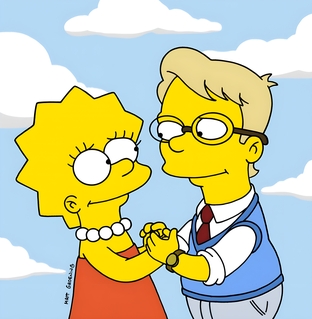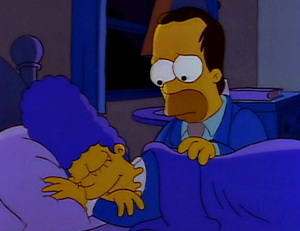Marjorie Jacqueline "Marge" Simpson (née Bouvier) is a character in the American animated sitcom The Simpsons and part of the eponymous family. Voiced by Julie Kavner, she first appeared on television in The Tracey Ullman Show short "Good Night" on April 19, 1987. Marge was created and designed by cartoonist Matt Groening while he was waiting in the lobby of James L. Brooks' office. Groening had been called to pitch a series of shorts based on Life in Hell but instead decided to create a new set of characters. He based the character on his mother Margaret Groening. After appearing on The Tracey Ullman Show for three seasons, the Simpson family received their own series on Fox, which debuted December 17, 1989.

Abraham Jebediah "Abe" Simpson II, better known as Grampa Simpson, is a recurring character in the animated television series The Simpsons. He made his first appearance in the episode entitled "Grandpa and the Kids", a one-minute Simpsons short on The Tracey Ullman Show, before the debut of the television show in 1989.
"Brush with Greatness" is the eighteenth episode of the second season of the American animated television series The Simpsons. It originally aired on the Fox Network in the United States on April 11, 1991. In the episode, Marge enrolls in an art class after Lisa encourages her to revive her former interest in painting. When she wins first prize in a local art competition for a portrait of Homer on the couch in his underwear, Mr. Burns commissions her to paint his portrait. In the subplot, Homer is determined to lose weight after getting stuck in a water slide at an amusement park.

"Trilogy of Error" is the eighteenth episode of the twelfth season of the American animated television series The Simpsons, and the 266th episode overall. It originally aired on the Fox network in the United States on April 29, 2001. In the episode, Homer's rush to the hospital to re-attach his severed thumb, Lisa's rush to school to win the science fair, and Bart's run-in with an illegal fireworks scheme are interconnected as each act tells the events of the same day, but from a different point of view.
"Life on the Fast Lane", also known as "Jacques to Be Wild" in the UK, is the ninth episode of the American animated television series The Simpsons. It originally aired on the Fox network in the United States on March 18, 1990. It was written by John Swartzwelder and directed by David Silverman. Albert Brooks guest starred as Jacques, a French bowling instructor, with him being credited as "A. Brooks".

"Lisa's First Word" is the tenth episode of the fourth season of the American animated television series The Simpsons. It was first broadcast on the Fox network in the United States on December 3, 1992. In the episode, as the Simpson family gathers around Maggie and tries to encourage her to say her first word, Marge reminisces and tells the story of Lisa's first word. Maggie's first word is voiced by Elizabeth Taylor.
"Bart vs. Thanksgiving" is the seventh episode of the second season of the American animated television series The Simpsons. It originally aired on the Fox network in the United States on November 22, 1990. In the episode, Bart runs away from home after destroying a centerpiece that Lisa makes for the Thanksgiving dinner table.

The Simpson family are the main fictional characters featured in the animated television series The Simpsons. The Simpsons are a nuclear family consisting of married couple Homer and Marge and their three children, Bart, Lisa, and Maggie. They live at 742 Evergreen Terrace in the fictional town of Springfield, United States, and they were created by cartoonist Matt Groening, who conceived the characters after his own family members, substituting "Bart" for his own name. The family debuted on Fox on April 19, 1987, in The Tracey Ullman Show short "Good Night" and were later spun off into their own series, which debuted on Fox in the U.S. on December 17, 1989, and started airing in Winter 1989.
"The Ziff Who Came to Dinner" is the fourteenth episode of the fifteenth season of the American animated television series The Simpsons. It originally aired on the Fox network in the United States on March 14, 2004. The episode focuses on Artie Ziff, who takes residence in the Simpson family's attic after declaring bankruptcy. After playing poker with Homer and losing, he gives Homer all the shares of stock of his bankrupt company. Homer then gets arrested and Marge gets upset with Artie.
"Lady Bouvier's Lover" is the twenty-first and penultimate episode of the fifth season of the American animated television series The Simpsons. It originally aired on the Fox network in the United States on May 12, 1994. In the episode, Abe Simpson falls in love with Marge's mother, Jacqueline Bouvier, and they start dating. However, on a night out in town, she is charmed by Mr. Burns. Abe is brokenhearted when he learns that Jacqueline is going to marry Mr. Burns.
"Half-Decent Proposal" is the tenth episode of the thirteenth season of the American animated television series The Simpsons. It first aired on the Fox network in the United States on February 10, 2002. In the episode, Homer's snoring interferes with Marge's sleep. To earn money to cure Homer's snoring, Marge agrees to spend a weekend with Artie Ziff if he vows to not grope her as he did during their high-school prom date. While spying on Marge and Artie, Homer mistakenly thinks they are making out, so he leaves with Lenny to work on an oil rig.
"A Star Is Burns" is the eighteenth episode of the sixth season of the American animated television series The Simpsons. It first aired on the Fox network in the United States on March 5, 1995. In the episode, Springfield decides to hold a film festival, and famed critic Jay Sherman is invited to be a judge.
"And Maggie Makes Three" is the thirteenth episode of the sixth season of the American animated television series The Simpsons. It originally aired on the Fox network in the United States on January 22, 1995. In the episode, Homer recounts the story of Maggie's birth when Bart and Lisa ask why there are no photos of her in the family album.
"The Front" is the nineteenth episode of the fourth season of the American animated television series The Simpsons. It originally aired in the United States on the Fox network on April 15, 1993. In the episode, Bart and Lisa decide to write an episode of The Itchy & Scratchy Show; after their script is rejected, they resubmit it under the name of their grandfather Abraham Simpson, resulting in Grampa being hired as a staff writer. Meanwhile, Homer returns to high school to retake a failed science course.
"A Streetcar Named Marge" is the second episode of the fourth season of the American animated television series The Simpsons. It first aired on the Fox network in the United States on October 1, 1992. In the episode, Marge wins the role of Blanche DuBois in a community theatre musical version of Tennessee Williams' A Streetcar Named Desire. Homer offers little support for his wife's acting pursuits, and Marge begins to see parallels between him and Stanley Kowalski, the play's boorish lead male character. The episode contains a subplot in which Maggie Simpson attempts to retrieve her pacifier from a strict daycare owner.

"I Married Marge" is the eleventh episode of the third season of the American animated television series The Simpsons. It originally aired on the Fox network in the United States on December 26, 1991. In the episode, Marge worries that she may be pregnant again and visits Dr. Hibbert's office. While anxiously waiting at home, Homer tells Bart, Lisa, and Maggie the story of his and Marge's marriage and Bart's birth. The episode was written by Jeff Martin and directed by Jeffrey Lynch.
"Another Simpsons Clip Show" is the third episode of the sixth season of the American animated television series The Simpsons. It originally aired on the Fox network in the United States on September 25, 1994. In the episode, Marge reads a romance novel in bed, and it prompts her to have a family meeting, where the Simpson family recall their past loves in form of clips from previous episodes.
"The War of the Simpsons" is the twentieth episode of the second season of the American animated television series The Simpsons. It originally aired on the Fox network in the United States on May 2, 1991. In the episode, Homer gets drunk at a dinner party and embarrasses Marge, so she enrolls them in marriage counseling at a lakeside retreat with Reverend Lovejoy.
Media is a recurring theme of satire on The Simpsons. The show is known for its satire of American popular culture and especially television culture, but has since its inception covered all types of media such as animation, journalism, commercials, comic books, movies, internet, and music. The series centers on a family and their life in a typical American town but the town of Springfield acts as a complete universe. The town features a vast array of media channels—from kids' television programming to local news, which enables the producers to make jokes about themselves and the entertainment industry.








